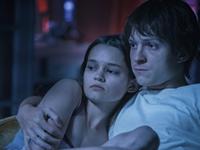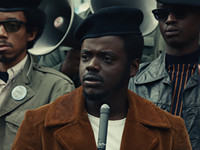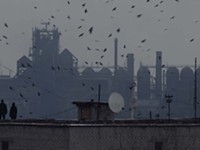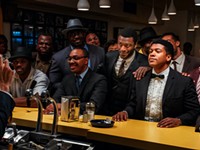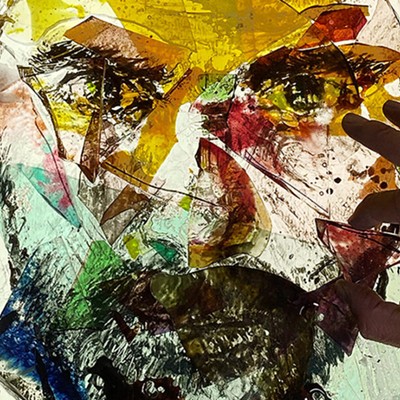[
{
"name": "500x250 Ad",
"insertPoint": "5",
"component": "15667920",
"parentWrapperClass": "",
"requiredCountToDisplay": "1"
}
]
The last time Aaron Sorkin delivered a story of an enigmatic tech visionary, we got the masterful "The Social Network," about Facebook creator Mark Zuckerberg. Now the Oscar-winning writer joins director Danny Boyle to take on the life of innovative Apple co-founder Steve Jobs, played here by an excellent Michael Fassbender. Despite the love that Jobs tends to inspire (Zuckerberg hardly arouses such passion in the general public), Sorkin nonetheless arrives at a similar conclusion: geniuses have a tendency to also be giant assholes.
With "Steve Jobs," Sorkin takes a page out of Apple's playbook and keeps things simple, confining the narrative to three sequences that take place backstage in the moments before three major product launches: the Macintosh in 1984, the disastrous NeXT system that followed Jobs' split from Apple in 1988, and finally the iMac in 1998. In the lead up to the events, Jobs interacts with the various crucial figures in his life. There's Apple's long-suffering head of marketing Joanna Hoffman (Kate Winslet); Jobs' friend and Apple co-founder Steve Wozniak (Seth Rogen, great in his first purely dramatic role); Apple CEO John Sculley (Jeff Daniels); Andy Hertzfeld (Michael Stuhlbarg), lead designer on the original Mac computer; and Jobs' former lover, Chrisanne Brennan (Katherine Waterston). Brennan is accompanied by her young daughter, Lisa (played by actresses Makenzie Moss at 5, Ripley Sobo at 9, and Perla Haney-Jardine at 19), whom she implores Jobs to accept as his own flesh and blood.
It's an intriguing way to structure a biopic, and a welcome divergence from the standard chronological summary that so many biopics take. But by its nature, it leaves a lot out, providing little to no introduction to who exactly these people are and assuming the audiences already have a certain amount of knowledge of Jobs' life. For those not well-versed in Apple lore, it might be helpful to watch Alex Gibney's documentary "Man in the Machine" or to read Walter Isaacson's biography (which serves as the basis for Sorkin's screenplay) as a primer to fill in the blanks. With its narrow focus, the film sometimes takes on the feel of a stage production, and there's a certain sense of theatricality in the way every important figure in Jobs' life seem to converge so they can hash it out with Jobs every time a new product launches -- Sorkin even has Jobs make a joke about it by the third time it happens.
Jobs betrayed those who considered him a friend and mistreated those who cared for him, and for their part everyone in his life seem to love and revile him in equal measure. Sorkin underlines the connection between Jobs and the closed systems of the machines he dreams up. His products are deliberately designed to be impossibly difficult to open up and modify, characteristics that are equally true of the man himself.
The '84 section is the best of the three sequences, buzzing with a sense of urgency as the major players work frantically to make sure last-minute preparations get taken care of, determined to deliver on the promise set by Apple's infamous "1984" Super Bowl commercial -- which debuted just days prior. Boyle keeps his typically ostentatious visual style in check, maintaining a fairly restrained look throughout. He's aided by Daniel Pemberton's excellent score, which morphs to suit the mood of each sequence -- from electronic to opera -- while lending each section a sense of tension.
Jobs spent many years denying that he was Lisa's father, and it's his relationship with the young girl that becomes the emotional through line of the film. His gradual acceptance of Lisa allows the cold and ruthless Jobs to receive a redemption. The last couple scenes in particular feel patently phony, and while effective, were clearly invented to give the otherwise unbending character of Jobs some semblance of an arc. And that's in keeping with the film that Boyle and Sorkin clearly set out to make, which is less concerned about specific facts than in delivering a satisfying look into technology of our modern age while exploring the idea of Steve Jobs.
As Jobs, Fassbender delivers a magnetic performance. Until the last section, he doesn't particularly look the part (the iconic glasses and black turtleneck help) but he nails his essence. Prone to self-mythologizing, Jobs earned a reputation as a tech genius while largely leaving the real technical work to others. When asked, he explains his role: "musicians play the instruments, I play the orchestra." Kate Winslet is terrific; the voice of reason, she keeps things from spiraling out of control, while imploring Jobs to behave like a decent human being and stop alienating everyone around him. "Steve Jobs" offers the first chance to hear the great actress take a crack at Sorkin's banter-filled dialogue, and it's as wonderful as you'd expect; the scenes between her and Fassbender are the film's finest.

